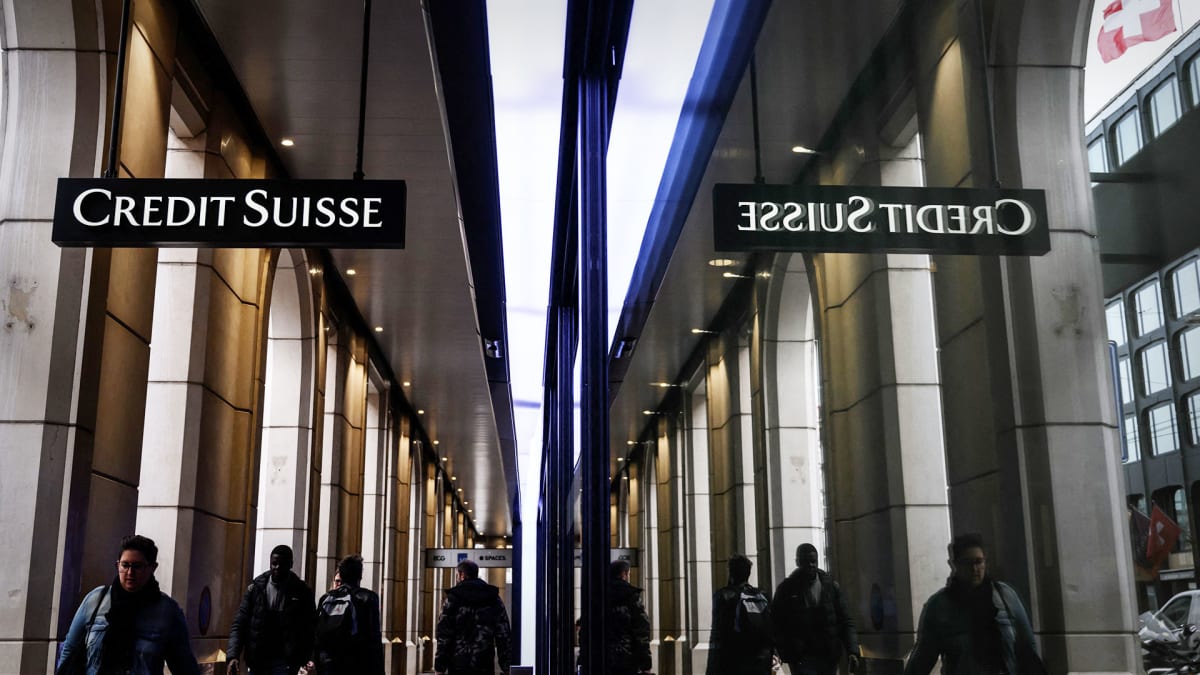
It's an awful day for Credit Suisse.
The European bank, flagship of Switzerland, is desperate.
The company has lost more than a third of its market value in the last three months.
And this Wednesday, March 15, things deteriorated further for the ailing bank.
Its largest shareholder, Saudi National Bank, announced that it will no longer invest in Credit Suisse (CSGKF) , saying a large stake would cause more regulatory headache.
Saudi National Bank Chairman Ammar Al Khudairy was asked by Bloomberg TV on March 15 whether his company was open to further injections if there was another call for additional liquidity.
"The answer is absolutely not, for many reasons outside the simplest reason, which is regulatory and statutory," Al Khudairy said, definitively ruling out the possibility.
Saudi National Bank, which is 37% owned by the sovereign wealth fund of Saudi Arabia, became the first shareholder of Credit Suisse as part of a capital increase operation at the end of last year.
The Stock Fell 22%
Saudi National bank had acquired 9.9% of the capital in exchange for an investment of 1.4 billion Swiss francs. But in just a few months, the value of this stake has already diminished by $500 million.
For Al Khudairy, a stake increase would mean additional regulatory hurdles. But Saudi National Bank does not want them and therefore prefers to avoid them. He had already made more or less similar comments last October. At the time, the executive said an increase in stake was "out of the question," although he said he appreciated the efforts of the new management team to revive Credit Suisse.
"If we go above 10%, all new rules kick in whether it be by our regulator or the Swiss regulator or the European regulator," Al Khudairy said. " We're not inclined to get into a new regulatory regime. I can cite five or six other reasons, but one reason is there is a glass ceiling and we're not going to entertain beyond it."
Al Khudairy's latest comments have weighed on Credit Suisse shares. The stock fell 24.24% to 1.70 Swiss francs in Zurich on March 15. This is a new record low. The bank's market capitalization was 8.83 billion Swiss francs ($9.5 billion).
The cost of insuring bonds issued by Credit Suisse has increased and is approaching very worrying levels.
Saudi National Bank's refusal to increase its stake is a real blow to Credit Suisse, which lost a historic shareholder earlier this month. Harris Associates, shareholder of the bank for more than twenty years, sold its entire stake.
Last October, it launched an emergency plan considered by many analysts and the markets as the last chance plan.
This plan focused on the asset management business. The firm wants to cut 9,000 jobs by 2025 in an effort to reduce its cost base by 14.5 billion Swiss francs in three years.
It is also planning to break up the investment bank into three parts. The investment bank was once the company's cash cow, but a series of scandals have cost Credit Suisse several billion dollars in losses and fines imposed by regulators.
The CEO Tries to Reassure
The company is also selling a "significant portion" of its Securitized Products Group business.
But since the launch of its plan, the bank has been plagued by more scandals. While these are not as serious as those which led to its descent into hell, they have managed to distract from the efforts of revamp.
On March 14, Credit Suisse indicated that it has reviewed its financial reporting and has detected "material weaknesses" related to the accounts for the 2021 and 2022 fiscal years. It also said that customers continue to withdraw their money even if at lower levels than last October.
"During early fourth quarter of 2022, Credit Suisse began experiencing significantly higher withdrawals of cash deposits as well as non-renewal of maturing time deposits. However, as the quarter progressed, these outflows stabilized to much lower levels but had not yet reversed by year end," the firm said.
Credit Suisse CEO Ulrich Körner tried to reassure on the financial situation of the bank.
"Nobody is pleased by the share price development, but we manage what we can manage, and this is the execution of our plan," He told Bloomberg TV.
The bank has suffered setback after setback since March 2021 and the bankruptcy of Greensill Capital, a specialized lender with links to former U.K. Prime Minister David Cameron.
The British company, which was founded in 2011 by the financier Lex Greensill, was a supply chain and accounts receivables lender, that specializes in lending money to companies so that they can pay their suppliers. It then packaging the debts of these companies into financial securities, which it resold to investors.
The house of cards began to crumble when these investors, including Credit Suisse, had doubts about the real value of the debts and abandoned Greensill, which then filed for bankruptcy in March 2021.
Credit Suisse invested $10 billion of its clients' capital in Greensill products.
This bankruptcy marked the beginning of a series of scandals that tarnished Credit Suisse's reputation and weakened it.
Last month, the Swiss Financial Market Supervisory Authority FINMA said that Credit Suisse "seriously breached its supervisory duty to adequately identify, limit and monitor risks in the context of the business relationship with Lex Greensill over a period of years."







